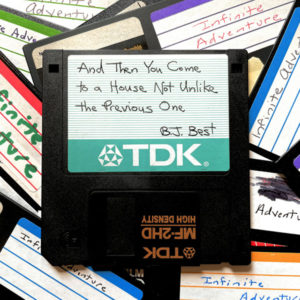See here for my IFComp 2021 scoring and reviewing rubrics.
And Then You Come to a House Not Unlike the Previous One is a lighthearted and inventive game about growing up in the 1980s. It’s chock-full of nostalgia for members of Generation X (raises hand): Its copious use of ASCII art, a righteous mix tape, the awesome BBS scene, and the totally bogus INSERT DISK #2 when your pirated 5 ¼″ copy only has disk one. I don’t know how well this all translates for younger players, but I bet most will be savvy enough to catch the references.
Beyond the pop culture touchstones, House also has a heart. Set in 1986 or 1987, the game opens with you, fourteen year-old Emerson, a teen gifted with a healthy imagination, and your friend Riley. Together you play Infinite Adventure, an era-appropriate computer adventure where every stage involves solving some pretty elementary puzzles. Eventually you begin moving between the computer world and the “real world” of Emerson and Riley, whose relationship is more complicated than it first seems. I found myself chuckling one moment and moved the next.
The rapport between the two teens feels authentic. Their fragility is never laid out in bland exposition. It comes through in their banter and their interaction with the computer before them. Both have their baggage, but the emotions are never overwrought. It’s not a John Hughes film, but it’s cut from a similar cloth.
Riley’s the same age as you, and you’ve been friends—unlikely, perhaps, but friends—since you moved to Columbus three years ago. You both like computer games, Journey, and not being cool. In another year, she’ll only wear black.
The execution is excellent. The prose and dialogue are spot-on, and the story develops organically. The shifting and blending between the “real world” and the computer world never left me confused. NPC interactions come off seamlessly.
That said, in the two hours I played, I was entertained but never intrigued. I felt the narrative heat could have been turned up a degree or two; I had trouble getting involved with the stakes. (Maybe I’m just too old.) When I broke off playing, I wondered if things were about to “pop”—but then again, I thought that a few times over the course of my session. The tension never rose above a low simmer, save for one moment when things were, say, a medium simmer.
And for all its admirable polish, the game felt a bit serialized. I wonder if I replayed it how similar the next run would be.
Still, And Then You Come to a House Not Unlike the Previous One offers an amusing trip down Nostalgia Lane. Of course, I’m pretty much its target audience, but I think most anyone will find something to enjoy in it.
